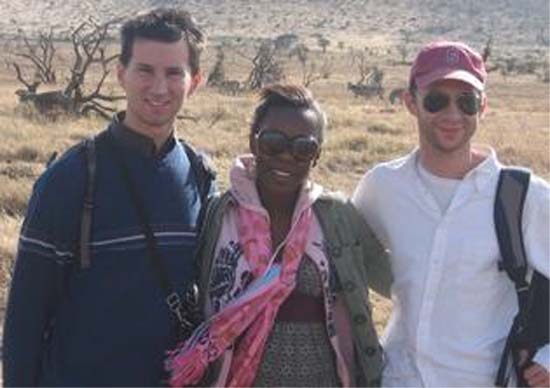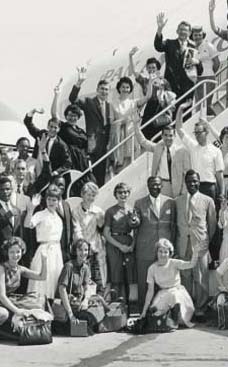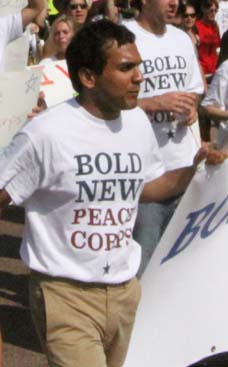
Currently Envaya has been deployed in Tanzania alone -- the country where Stern had established relationships with citizens, foundations, and government officials during his Peace Corps experience -- and there it has been going gangbusters. Led by social entrepreneur Radhina Kipozi, the Envaya team on the ground in Tanzania has trained local volunteers in computer literacy and outreach. Since the site's debut in Tanzania in mid-2010, 350 organizations have joined. The website's environmental outreach has been spearheaded by Jeff Schnurr, who also founded Community Forests International, which has helped plant more than 100,000 trees on the island of Pemba. The "offline" impact for Envaya's users has been subtle but significant: The Africa Climate Change Initiative in Dar es Salaam has been following environmental groups on Envaya to develop a national climate-change strategy based on local experiences. Schurr's Community Forests International has, through Envaya, connected with dozens of other tree-planting groups throughout Tanzania to share best practices for saving seeds, accessing seed banks, and replanting. The first step for Envaya has been simply getting organizations like these online. As Stern and Young expand to new countries -- Rwanda and Kenya are next, with pilots in several others to follow -- they will, with the help of the open-source community, be designing more sophisticated collaboration tools, communication tools, vertical specific tools (for certain kinds of organizations), mobile payments, and GPS tools for monitoring and reporting phenomena such as tree growth and crop developments. These tools that will be built with the same "ultralight" and simple but elegant approach inherent in Envaya's core technology.
Envaya, founded by Tanzania RPCV Joshua Stern, aims not just to help connect the 2 billion-plus people worldwide who currently have no access to the internet, but to help these populations build the foundations of civil society
How wiring the developing world can help save the planet
by Amanda Little
26 Mar 2011 3:08 PM
Like most equatorial countries, Tanzania is feeling the impacts of climate change. Malaria is spreading to areas at ever-higher altitudes. Lake Victoria, which feeds the Nile, is retreating. The rainy season is starting later and getting shorter -- last year, the typically four-month season lasted just two, cutting soil moisture and stunting crop growth. Fodder for grazing animals is getter scarcer. Some farmers are foregoing water-hungry crops like corn, beans, and bananas in favor of mono-cropping plants like cassava, a tuber that is drought-resistant.
These and other effects of global warming, which might otherwise go undocumented and unnoticed, are being recorded on Envaya.org, an online network designed, at the most basic level, to connect third-world populations to the web.
Even people who live hundreds of miles from a cable, a phone line, or a paved road, and who subsist on a few dollars a week, can use Envaya's ultralight platform to establish websites. The site is geared toward community organizations working to address issues ranging from deforestation and climate change to sexual abuse and special-needs education. It links these groups to each other, to potential funders, and to the rest of the world.
Envaya aims not just to help connect the 2 billion-plus people worldwide who currently have no access to the internet, but to help these populations build the foundations of civil society. It could also help super-charge the global environmental movement -- knitting together local but fast-growing collectives of activists who are planting trees, protecting waterways, promoting biodiversity, and encouraging sustainable agriculture throughout the developing world. With internet access available and easy to use in low-connectivity environments, decentralized groups could form a unified front against global warming.
Envaya was cofounded just over a year ago, in mid-2010, by 27-year-old Joshua Stern. After graduating Stanford in 2006 with a BS in computer science, Stern forsook Silicon Valley to enlist in the Peace Corps. At the age of 23, he was posted to the island of Pemba, part of the Zanzibar archipelago off the coast of Tanzania. No more than a handful of people among the largely Muslim population of roughly 350,000 had ever touched a keyboard, let alone typed an email. Stern and his team of fellow volunteers built computer labs in schools, hospitals, and community centers, installing dozens throughout the island. They trained hundreds of students, parents, and teachers in the very basics -- how to double-click, hunt-and-peck type, use a search engine.
During this time, Stern recognized two trends. First, the penetration of telecom in the region was surging. Companies like Vodacom, Tigo, Airtel, and Zantel entered East Africa in the early 2000s, and by 2008, some 20 million of Tanzania's 40 million population had cell phones or USB devices that enabled laptops and computers to connect to the internet via cellular link. The problem was a huge software gap. There were no tools or interfaces that could readily be used by people with limited computer skills in low-connectivity environments (the cellular connections had limited bandwidth and are, to this day, often slower than dialup).
Meanwhile, a grassroots activist movement was building throughout Tanzania and East Africa. Thanks to relatively stable governments, community organizations were springing up by the hundreds, addressing a broad range of civil society concerns from the environment to education, public health, and the arts. And yet these groups had no way of publishing research, sharing information, following each other's progress, and connecting to funders and lawmakers.
Josh, Jesse, and Radhina from Envaya.orgEnvaya cofounders Jesse Young (left) and Joshua Stern (right), with Radhina Kipozi, the group's Tanzania program manager.Enter Envaya -- a tool designed both to bridge the digital divide and eliminate barriers to social action. Focusing on design challenges that demanded easily usable but technically sophisticated features, Stern teamed up with fellow Stanford computer-science grad Jesse Young to develop software designed to be ultralight, allowing users to publish content, connect with each other, and collaborate in a low-bandwidth and low-tech environment.
Envaya profiles are meant to serve as complete and functional websites for users. Like Meetup.com, the software allows participants to organize conferences and events. And like Facebook, the software allows people to create and define their identities. But while Meetup is limited in function to event planning and does not work well on low-bandwith, low-tech equipment, and Facebook is a social network for individuals, Envaya is a functionally versatile and open network of civil society organizations.
Currently Envaya has been deployed in Tanzania alone -- the country where Stern had established relationships with citizens, foundations, and government officials during his Peace Corps experience -- and there it has been going gangbusters. Led by social entrepreneur Radhina Kipozi, the Envaya team on the ground in Tanzania has trained local volunteers in computer literacy and outreach. Since the site's debut in Tanzania in mid-2010, 350 organizations have joined. The website's environmental outreach has been spearheaded by Jeff Schnurr, who also founded Community Forests International, which has helped plant more than 100,000 trees on the island of Pemba.
The "offline" impact for Envaya's users has been subtle but significant: The Africa Climate Change Initiative in Dar es Salaam has been following environmental groups on Envaya to develop a national climate-change strategy based on local experiences. Schurr's Community Forests International has, through Envaya, connected with dozens of other tree-planting groups throughout Tanzania to share best practices for saving seeds, accessing seed banks, and replanting.
The first step for Envaya has been simply getting organizations like these online. As Stern and Young expand to new countries -- Rwanda and Kenya are next, with pilots in several others to follow -- they will, with the help of the open-source community, be designing more sophisticated collaboration tools, communication tools, vertical specific tools (for certain kinds of organizations), mobile payments, and GPS tools for monitoring and reporting phenomena such as tree growth and crop developments. These tools that will be built with the same "ultralight" and simple but elegant approach inherent in Envaya's core technology.
As these tools develop, Envaya could play a key role in emerging carbon markets. GPS-enabled mapping and reporting tools could help verify where trees are being planted, where forests are being protected, and how much carbon is being stored through those efforts. Envaya's transparent network might also help monitor the exchange of carbon credits and ensure that the people who are working to protect and grow forests are seeing the rewards. Similar mapping tools could also enable agriculture experts in wealthy nations, for instance, to monitor and investigate crop failures in remote regions of the developing world and provide solutions to poor and rural farmers.
Envaya is not about markets; it's about the groups that are working to promote change, building a sense of community and fellowship, and helping larger institutions function. That said, Envaya could have a big impact on markets. The more people connect to the internet, the more they start to see the internet as a way of doing business -- and the more businesses can connect to them. From the standpoint of the Googles, Amazons, eBays, and Facebooks of the world, Envaya can be a way of connecting billions of developing-world civilians to the internet, which will ultimately facilitate fast-evolving markets.
In a sense, civil society can be thought of as a dominant industry in the developing world, and serving those needs will help drive economic development as a whole. Envaya can help identify good projects on the grassroots level, and facilitate their connection to larger organizations that can provide decisive support. Consider the challenge of reliable electrical power in Tanzania and throughout the developing world, one of the critical problems handicapping economic development. Envaya can, for example, connect a local community-based organization looking for ways to power a new water pump to an NGO focused on solar power. It can, in the bigger sense, serve as a bridge between people on the ground who know what they need and companies and foundations that can provide equipment, services, and expertise.
In the long run, Envaya could have more influence in the fight against climate change as a shaper of markets than as a tool for grassroots activists. But Stern is aware that markets won't function unless the societies within them are functioning. For now, Envaya's focus is not on building revenue streams but on building tools that can ultimately help societies -- and ecosystems -- in the developing world thrive.
This piece was adapted from the Forbes.com "Power Trip" blog.















